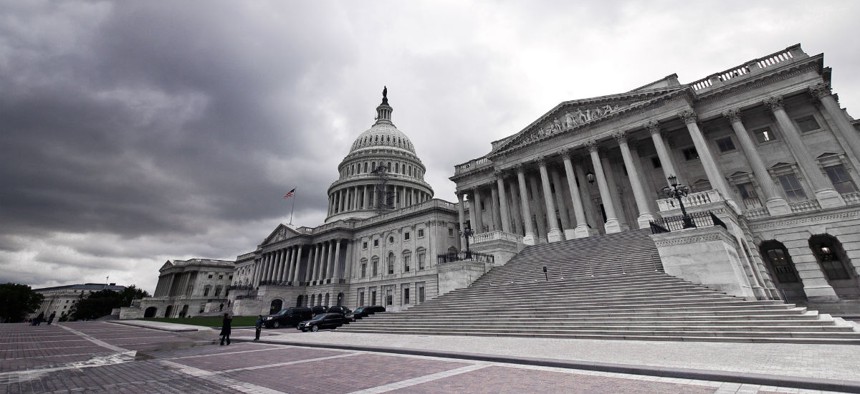The Brewing Government Funding Storm That Wasn’t Supposed to Happen
The political calculus is changing, and not for the better.
Think the impacts of this year’s presidential election won’t be felt until 2017 (excluding the Trans Pacific Partnership and Merrick Garland Supreme Court nomination)? Not so fast. Think the two-year budget deal agreed to by Congress and President Obama will still, as intended, head off an appropriations impasse this year? Again, not so fast.
The fact that the Republican leadership in Congress decided to not hold hearings on Obama’s proposed budget for 2017 was disappointing, but not entirely shocking or even worrisome. The lack of hearings does not automatically equate to a lack of action. Thus, until recently there hasn’t been too much reason to be concerned about an appropriations impasse. While debate over specific spending was inevitable, the whole point of the top-line budget deal negotiated last year was to ensure that government operations would not be interrupted in an election year. The political liabilities were deemed to be too great to allow it.
But today there are disturbing signs that the political calculus is changing, and not for the better. There is now real reason to be concerned about the chances of getting any appropriations through Congress, at least any that would survive the veto pen.
The first sign of trouble came when a group of Republican congressmen announced that they were no longer going to support the 2015 budget deal. By itself, this presented a political inconvenience that most believed could be overcome. But the dynamics of the primary season greatly complicate things and potentially strengthen the hand of those who want to draw a firm line in the sand. Think about it. The vast majority of Republicans and a not insignificant percentage of Democrats voting in primaries to date have cast their votes for “absolutist” candidates, i.e., Trump, Cruz and Sanders. Each in his own way represents a “not only no, but hell no” point of view, on a range of issues, including federal spending (although on that count the Sanders creed might better be described as “not only yes, but hell yes”). Despite the many differences that exist among them, they have all been running as candidates that would, in fact, draw some pretty dramatic lines in the sand.
Meanwhile, most members of Congress will be answering to the electorate in the coming months. Given that over 90 percent of congressional seats are only competitive in a primary, that there has been a sharp increase in Republican primary voters, and that the challengers who win primaries typically reflect a more extreme position than the incumbent, the potential storm ahead begins to take shape. We’ve already seen this play out with the victory of a Tea Party Republican for the seat previously held by former Speaker John Boehner and the admission by longtime Senator Richard Shelby, R-Ala., that a challenge from his right had caused him to harden his position on core issues.
Now, as lawmakers face their hometown voters for the first time in this election cycle, the question is the degree to which those same pressures will affect their near term actions. What incentive do they have to support spending bills that do not comport with their primary voters’ increasingly absolute perspectives? What incentive will they have, even if unchallenged in the primary, to do or say anything other than what appears to be the new, emerging orthodoxy of their party?
While predominantly a Republican issue, the impacts could also be felt by democratic candidates. As one commentator put it, there is “no doubt” that Bernie Sanders will win the Democratic nomination; the only question is whether he’s wearing a rumpled suit or a nice pantsuit. The point being, of course, that Sanders’ positions have dominated the narrative of the Democratic race. That too will have an impact on Democrats running in those areas where Sanders did well.
Like so much of what characterizes the current political scene, this is an increasingly ugly picture. Politics aside, it again raises the disturbing specter of a government weighed down by renewed fiscal uncertainty—including the potential for a government shutdown—and all of the predictable behaviors we have seen in recent years, behaviors that impact every corner of the government ecosystem.
So, add this to the list of challenges facing congressional leaders over the next few months. How does one build a coalition of the willing when all signs point to an electorate that is just the opposite? That’s a tough order. The only hope may lie in a lame duck session, but even that is an uncertain prospect. In short, this is rapidly becoming a major leadership challenge; the question is whether there is any real leadership to overcome it.
Stan Soloway is CEO of Celero Strategies LLC.







